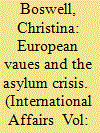| Srl | Item |
| 1 |
ID:
067867


|
|
|
|
|
| Publication |
Aldershot, Ashgate, 2005.
|
| Description |
viii, 178p.
|
| Series |
Ethics and global politics
|
| Standard Number |
0754645193
|
|
|
|
|
|
|
|
|
|
|
|
Copies: C:1/I:0,R:0,Q:0
Circulation
| Accession# | Call# | Current Location | Status | Policy | Location |
| 050807 | 174.936287/BOS 050807 | Main | On Shelf | General | |
|
|
|
|
| 2 |
ID:
007059


|
|
|
|
|
| Publication |
July 2000.
|
| Description |
537-558
|
|
|
|
|
|
|
|
|
|
|
|
|
|
|
|
| 3 |
ID:
055408


|
|
|
| 4 |
ID:
192992


|
|
|
|
|
| Summary/Abstract |
The UK government’s e-Borders project presents an intriguing anomaly: despite repeated and acknowledged failings of the project over two decades, it has remained a core part of border strategy across successive administrations. This article seeks to explain the surprising resilience of this programme by developing the concept of political lock-in. We combine insights from critical security studies with science and technology studies concepts of ‘tech hype’ and lock-in. We apply these insights to trace how e-Borders was constructed as a compelling technological solution to pressing security issues. This created a form of political lock-in, whereby the project became impossible to abandon because of its political urgency, despite increasing awareness of its unfeasibility. With the project caught in a liminal state of non-completion, successive governments expanded the scope of the programme by attaching new security problems to it, thereby rendering it even more unviable. Our analysis thus throws up a paradox: rather than mobilizing resources to accomplish its tech vision, securitization created forms of lock-in and paralysis that made the programme more difficult to accomplish.
|
|
|
|
|
|
|
|
|
|
|
|
|
|
|
|